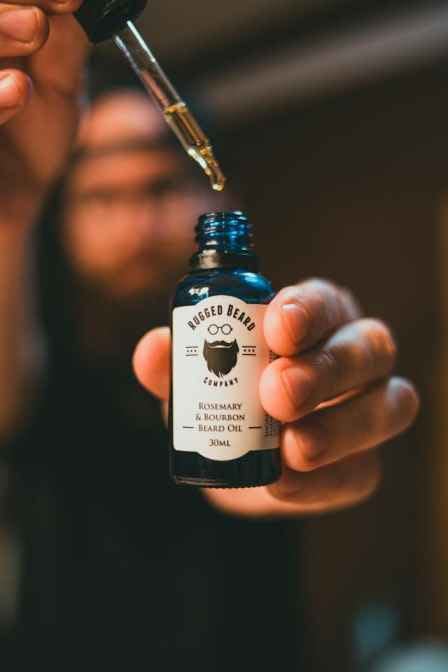Adding an essential oil for a beard growth journey is the wisest decision, especially for the one who loves to choose natural remedies over chemical-based products.
In the study of 2015, we analyzed the comparative study of rosemary oil and minoxidil 2%, where we found rosemary oil’s efficacy in the androgenetic alopecia treatment.
But does it work effectively on the beards also?
In this blog, we will discuss every aspect of rosemary oil for beard growth. How it comes, benefits, side effects, and more.
Table of Contents
Understanding Rosemary oil:
Rosemary oil comes from the leaves or bushes of the rosemary plant (Rosmarinus officinalis L.) through the steam distillation process.
Earlier, people used it as a medicine to treat spasms, headaches, migraines, insomnia, emotional upset, and depression.

Rosemary oil is a potent essential oil rich in vitamins A, B, and C.
Nowadays, it is used widely for different purposes like improving scalp and hair health, aromatherapy, respiratory health, treating skin problems, and more.
The science behind Rosemary oil and DHT:
There is always a confusion while talking about rosemary, DHT, and beard growth.
According to some studies, rosemary can block DHT, that impact beard growth.
Before understanding that, you must know what DHT is and its relation to beard growth.

What is DHT?
DHT stands for dihydrotestosterone. It is a sex hormone or androgen derived from testosterone via an enzyme called 5-alpha reductase (5-AR).
It is responsible for male sexual characteristics, development of prostate glands, deepening of voice, facial and body hair growth, and reproductive functions in males.
However, it is present both in male and female, but male has more DHT than female.
According to studies, a higher level of DHT can cause male pattern baldness and enlarged prostate in men.
For that, people usually consider medication or remedies that can block DHT to slow down hair fall. Though, DHT is crucial for beards.
You may have seen bald people with thick beards. The reason could be the same.
How does DHT impact beard growth?
As I told you earlier, DHT or testosterone are the most crucial hormones for facial hair growth.
You may have noticed during puberty, the testosterone levels increase and the conversion rate of testosterone to DHT becomes more active.
The sudden rise in DHT production is responsible for the significant increase in facial hair growth.
Apart from this, DHT plays a significant role in the thickness and color of the beard.
However, it is crucial to note that DHT effectiveness on beard growth varies from person to person.
Genetic factors, age, lifestyle, sensitivity of hair follicles to DHT, and overall hormone levels all play a vital role in beard growth.
While some people’s beards grow slower or in patches, others may grow faster and fuller due to a genetic tendency to be more susceptible to DHT.
Does rosemary block DHT?
Yes. Rosemerry can block DHT. It hinders the the function of enzyme (5-alpha-reductase) by 94%, due to which it reduces the conversion of testosterone to DHT.
It is beneficial for people with high levels of DHT and suffering from male pattern baldness. However, it may impact beard health slightly.
Is rosemary oil good for beard growth?
From the above theory, you may conclude that rosemary is worse for healthier beard growth.
Well, the studies said that DHT is mainly responsible for beard growth in the early phase, during puberty.
As we get older, our beard growth, its thickness depends on testosterone only.
The potential of rosemary oil to inhibit DHT won’t hinder the growth of your beard. However, it’s unlikely to encourage the growth of a beard instead.
Benefits of rosemary oil for facial hair growth
Let us discuss how rosemary oil can encourage the beard growth:

- Improve blood circulation
Massaging rosemary oil in diluted form helps to improve blood circulation in that area.
Good blood circulation means better nutrition and oxygen delivery to the hair follicle, encouraging healthy beard growth.
- Antioxidant properties
Free radicals are highly reactive and unstable molecules in the human body and environment.
Some sources of free radicals include exposure to environmental factors like pollution, tobacco smoke, radiation, and ultraviolet (UV) rays from the sun.
Excess free radicals can cause oxidative stress that can damage cells, proteins, and DNA, contributing to the coarse, brittle, and greying of beards.
Rosemary oil has antioxidant properties, help to neutralize the harmful effects of free radicals, and prevent cell damage.
- Reduce itching and irritation:
Beard itching or irritation can occur for various reasons like dry skin, ingrown hair, skin allergies, bacterial or fungal infections, beard dandruff, improper care, or climate change.
Using natural oil like rosemary can relieve itching, inflammation, and irritation as it has anti-inflammatory, antifungal, and antimicrobial properties.
Moreover, you must have a proper beard care routine because half of the problems start with improper care.
- Stress relief:
The reason for having stress could be anything in this chaotic world. Stress can affect your beard in many ways.
Having slow beard growth, premature greying, hair loss, beard thinning, skin problems like acne, eczema, and increased beard dandruff are some of them.
Aromatherapy using rosemary essential oil can help to relieve stress and prevent most of the problems.
In addition, include stress management techniques, such as exercise, meditation, deep breathing, and adequate sleep.
These practices can help maintain healthy hormone levels, improve blood circulation, and reduce the impact of stress on your beard and overall well-being.
- Prevent beard dandruff
Beard dandruff happens due to yeast growth called Malassezia on the skin. The body’s response to the yeast causes greasy, flaky skin.
You may also feel red skin under your beard, yellow or white greasy flakes, and persistent itching.
Using rosemary oil on beards helps to combat beard dandruff as it has antifungal and antimicrobial properties.
If you reduce beard dandruff with continuous use of rosemary, the beard fall will stop, and your beard may appear thicker in fewer months.
- Provide nourishment
As I said before, rosemary oil is a healthy source of minerals and vitamins. It is high in magnesium, pantothenic acid, niacin, folate, thiamin, and riboflavin.
For healthy beards, you need to nourish them from the inside also. A rich source of vitamins like A, B, and C, rosemary helps to nourish the hair follicles and strengthen them from within.
Healthy skin, nervous system and digestive systems are essential for healthy beard growth. Vitamins such as niacin help with these processes.
How to use rosemary oil for beard growth?
Adding any essential oil to your beard care can be dangerous if you do not know the actual way of using it.

Before putting any essential oil or rosemary oil, ensure you have diluted it with some natural oils.
Read this section with a whole focus to avoid any mishappening.
- How to find the right rosemary oil?
The market has a variety of brands at different price ranges. Choosing the right product that is natural and benefits you at its best can be complex.
Here we shared a list of things you must consider before buying rosemary oil:
- Check the label of the oil. The only ingredient should be Rosmarinus officinalis(scientific name of rosemary) and must be 100% pure, with no additives and synthetic fragrance.
- The extraction method should be steam distillation, which is the best technique to make rosemary essential oil.
- Feel the aroma. Try to get the fragrance from a distance. It must have a fresh, herbaceous, and slightly woody aroma.
- While high-quality rosemary essential oils can be more expensive, low prices can be a red flag. Consider purchasing it from well-known and reputable brands to get a genuine product.
- Buy any essential oil that comes in dark glass bottles. It protects the oil from light and UV exposure, which can degrade its quality.
- How to dilute rosemary oil before use?
To avoid any side effects, diluting rosemary oil is crucial. Fortunately, it is an easy process.
The dilution ratio depends on the intended use and your skin’s sensitivity. A dilution ratio is 2-3% for most purposes:
- For general use and maintenance: 2-3 drops of rosemary oil per 15 ml of carrier oil.
- For facial applications or sensitive skin: 1-2 drops of rosemary oil per 15ml of carrier oil.
- Which carrier oil is best for dilution?
I recommend three oils for dilution. You can use any one of them or a small quantity of all to make a beard oil.
- Coconut oil: Coconut oil is the best oil to dilute rosemary or any other essential oils. It has natural antibacterial properties, which prevent any skin irritation, itching, and dryness and promote healthier growth. It moisturizes the beard, reduces frizziness, and provides a soothing, fresh fragrance.
- Jojoba oil: Jojoba oil for the beard is the best choice for carrier oil as its texture resembles natural skin oil, which absorbs better and provides deeper nourishment. The non-greasy oil softens and conditions the beard by reducing frizz, dryness, and dandruff and promoting healthier beards.
- Almond oil: Almond oil for the beard is a versatile and nourishing option. It’s rich in vitamins and fatty acids that reduce dryness, prevent split ends, and moisturize and condition beard hair. It reduces beard dandruff, soothes irritated skin underneath and promotes beard growth.
- How to apply rosemary oil on a beard?
Step1: Patch test
Apply the diluted rosemary oil to a small area of your body. Apply it to the neck, wrist, or behind the ear, and leave it on for at least twelve hours. You should cease using it right away if you experience any sensitivity or irritation there. Proceed with the steps if not.
Step 2: Cleansing
Applying anything on the face filled with dirt, oil, and debris can lead to acne or skin infections. So wash your face with a mild cleanser before applying diluted rosemary to your beards.
Step 3: Application
Apply a small amount of oil to your palms, rub your hands together, and gently massage it into your beards and the skin underneath. Avoid applying near your eyes, nose, and mouth.
Step 4: Brushing
Brushing your beard can enhance the effect of using rosemary oil on your beard. It improves blood circulation in that area, lets the oil spread everywhere, and supports better absorption.
- How often should I use rosemary oil for beard growth?
Using rosemary oil on the beard twice daily is sufficient to notice changes in a few months. If you have more concerns like dryness or greasiness, you can apply it accordingly.
Some comparative studies:
- Is rosemary oil better than minoxidil?
Minoxidil is a pharmaceutical medication approved by the FDA for combating genetic balding or hair loss. It comes in different forms like: topical solutions or foams.
It stimulates hair growth by extending the growth phase of the follicle and blocking the effects of DHT.
Minoxidil for beard growth can be considerable under the supervision of doctors as it is recommended to use only on the scalp to combat male pattern baldness.
It may help an individual to stimulate beards who has genetical issues. While it was suitable for people with patchy beards, you may suffer side effects on skin like dryness, itching, or irritation.
On the other hand, rosemary oil is a natural alternative to minoxidil that also helps with hair growth.
But the only difference is it can also be helpful for beard growth. It moisturizes, condition, and nourish them with their nutrient efficiency.
Although it doesn’t have the rigorous scientific backing support as minoxidil, many people value its all-natural, non-irritating qualities.
- Which is better for beard growth, rosemary oil or peppermint oil?
Peppermint oil is a popular choice for enhancing beard growth. It comes up with benefits like combating beard dandruff, soothing itching and irritation, and providing a refreshing and awakening aroma.
Rosemary oil has an herbal, woody scent and helps in strengthening hair follicles and reducing breakage.
It helps to thicken beards while soothing irritated skin underneath. Its anti-inflammatory properties can relieve itching and redness.
Selecting an oil between these two is a matter of taste. Both may or may not be successful based on the individual.
Some people may prefer the stimulating and refreshing sensation of peppermint oil, while others find the calming and strengthening properties of rosemary oil.
Does rosemary oil have any side effects?
Rosemary oil is usually safe when used topically in a properly diluted manner under supervision. Still, people with sensitive skin may face some side effects from using it.
Here, I have listed a few side effects that can occur:
Skin Irritation:
Even diluted rosemary oil can affect your skin and cause itching, irritation, redness, or a burning sensation.
Always dilute it with a natural carrier oil, like coconut or jojoba oil, before applying it to the skin.
Allergic Reactions:
Some individuals are sensitive or allergic to rosemary oil. Perform a patch test on a small area before using it entirely to check for adverse reactions.
Photosensitivity:
Rosemary oil can make your skin more susceptible to sunlight, potentially increasing the risk of sunburn.
You should use rosemary oil on your face in the evening or when you won’t be under direct sunlight.
Always wear sunscreen if you need to go outdoors after applying rosemary oil to your face.
Affect Eyes and Mucous Membranes:
Keep your rosemary solution way away from eyes, nose or mouth. It can irritate these areas.
If you experience any adverse reactions, such as redness, itching, or discomfort, discontinue using rosemary oil on your face and consult a healthcare professional if necessary.
FAQs:
How does rosemary oil help grow a beard?
Rosemary oil stimulates blood circulation to the facial hair follicles, promoting hair growth. Its antioxidants strengthen hair and prevent breakage, resulting in a fuller beard.
Can you put rosemary oil on the face?
Yes, you can apply diluted rosemary oil to the face for various benefits. You must dilute it with a carrier oil to avoid skin irritation.
Does rosemary oil grow new hair?
Rosemary oil may help stimulate the growth of new hair, particularly on the scalp and in the beard area. It’s not a guaranteed solution, but it can be effective for some individuals.
Can I use rosemary oil every day?
It’s generally safe to use rosemary oil daily, provided it’s properly diluted and doesn’t cause skin irritation. Consistency can yield the best results for beard care or hair growth.
How long does rosemary oil take to regrow hair?
The time it takes for rosemary oil to regrow hair varies from person to person. It can take several weeks to months of consistent use to see noticeable results. Patience and regular application are the key.
Conclusion:
Rosemary oil for beard growth is a natural and effective solution for maintaining a lustrous beard.
It strengthens the beard with essential vitamins and minerals, prevents beardruff, and stimulates growth.
Moreover, it blocks DHT, which is a crucial hormone that supports beard health. But there is a slight effect after hitting puberty.
Using rosemary oil in a proper dilution daily can lead to positive results. However, having a balanced diet, sleep, lifestyle, and hormonal levels do play a crucial role.
Kayden is an entrepreneur, writer, hairstylist working in a professional salon. He specializes in men’s grooming. He loves to blog about beards, hairstyles, and skincare.
